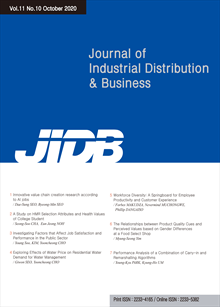간행물
산경연구논집 (JIDB) KCI 등재 산경연구논집 The Journal of Industrial Distribution & Business (JIDB)

- 발행기관 한국유통과학회
- 자료유형 학술지
- 간기 월간
- ISSN 2233-4165 (Print)2233-5382 (Online)
- 수록기간 2010 ~ 2020
- 주제분류 사회과학 > 경영학 사회과학 분류의 다른 간행물
- 십진분류KDC 325DDC 330
권호리스트/논문검색
Vol. 3 No. 2 (2012년 9월) 3건
1.
2012.09
서비스 종료(열람 제한)
Purpose - Distribution channels cannot function without cooperation. While evidence suggests channel power plays a fundamental role in fostering successful manufacturer-dealer channel cooperation in Western countries distribution systems, little is known empirically as to how dealers’possession of non-mediated powers influence SME manufacturers’ cooperation in Asian developing countries. Research design, data, methodology - Drawing upon the extant distribution channels literatures; this study conceptualizes a model and examines the effects of dealer’s non-mediated powers on manufacturing SME firms, as well as the mediating influence of trust, relationship satisfaction and commitment. A survey of 400 manufacturing SMEs in Taiwan empirically supports the proposed hypothesis. Results - The model is acceptable in terms of overall goodness of fit. Acceptable model fit are indicated by χ2/(df): 2.35, GFI≧.90; RMSEA values≦ .08; IFI, TLI and CFI values≧.90. Our results indicate that, GFI (0.910), IFI (0.937), TLI (0.903), CFI (0.936), and RMSEA (0.079) and therefore, achieved the suggested thresholds. Conclusions - The results of this study have some managerial implications for managers in the dealer’s firms. The overall implication from the findings is that managers can utilize expert, referent and traditional legitimate powers to attain channel cooperation with manufacturing SMEs in addition to garnering their trust, relationship satisfaction and commitment.
2.
2012.09
서비스 종료(열람 제한)
Purpose - The objective of the paper is to explain the factors affecting on the Re-contract intension of franchisor in the uprising Chinese franchise market. Research design, data, methodology - The study conducted a survey on the 400 franchisors data in China from January to July 2012.By AMOS analyzing the data to examine these hypotheses empirically, we can confirm most hypothesis supposed. Results - This study shows that the high management performance and satisfaction of the franchise headquarters has a positive effect on the Re-contractintention of franchise. In the case of large markets such as China, the franchisor's strategy and the role is very important. Conclusions - This study provides franchisors and practitioners, who plan to extend their franchising business abroad into Chinese market, with some practical knowledge. in order to achieve stable profits, the franchise corporation needs to support the operation of the individual franchisee through incentives and standardization of services.
3.
2012.09
서비스 종료(열람 제한)
Purpose - The objective of the paper is to explain theeconomy and trade developmentbetween South Korea and Shandong, strengtheninglogistics Industry cooperation of both sidesincreasingly important. Research design, data, methodology - The study conducted a survey on Shandong is the earliest economy and trade exchanges with South Korea in China. Shandong and South Korea share the similar geopolitical, the same culture and long exchange history etc. Results - This study explorescurrent situation and existing problemsthe logisticscooperation betweenKorea and Shandong, andrecommendations so as to furthertradebetween two sides. Conclusions - Logistics cooperation of China and South Korea is an important part of the international logistics cooperation in Northeast Asian Economic Circle, and the logistics cooperation betweenShandong and South Korea occupies an important position in logistics cooperation of China and South Korea.

